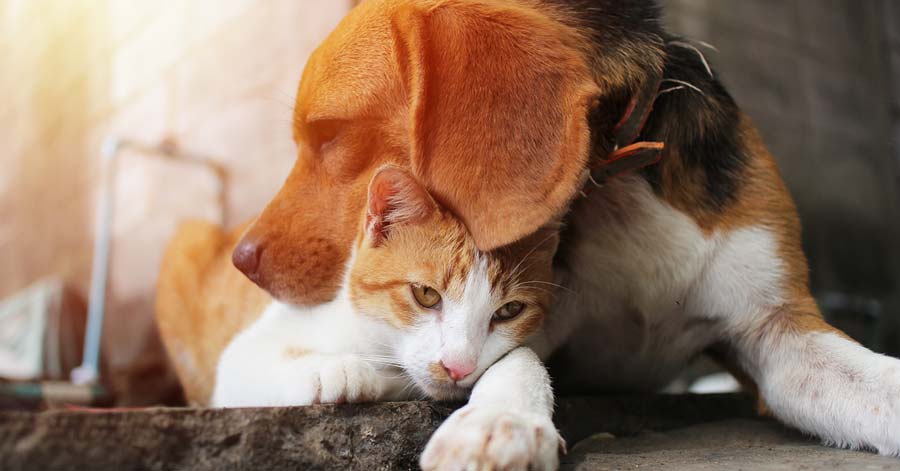The Facts about Cancer
in Dogs and Cats

Cancer in humans is on the rise. The statistics for cancer in pets is no different. According to the Comparative Oncology Program of the U.S. National Cancer Institute,1 there are 65 million pet dogs and 32 million pet cats in the United States. Approximately 6 million new cancer diagnoses are made in dogs and the same number made in cats each year.2
If you suspected that your dog or cat had cancer, what would you do? Here are some basic facts and tips to can help your furry friends live a healthy, long life.
More Statistics about Dogs, Cats and Cancer
Let’s first take a look at some statistics about animals and cancer:
-50% of dogs over 10 years of age die from cancer.3
-Cancer is also the most common cause of death in older cats, occurring in about 32% of all cats over age 10.4
-The most common cancer for dogs is lymphoma, or cancer of the lymph nodes.5 Thyroid cancer, lung tumors, mammary gland cancer, oral melanoma, “mast cell” tumors, and tumors on the trunk or limbs are also common. Anal gland adenocarcinoma and hemangiosarcoma (sarcoma in the lining of blood vessels) are cancers that almost exclusively occur in dogs.
-The most common cancer for cats is lymphoma as well, often connected to Feline Leukemia Virus (FeLV).6 Cats also tend to get mast cells tumors as well as squamous carcinoma and fibrosarcoma, which can be connected to vaccinations. Others that are not as common but still occur are lung, brain, nasal, liver, and mammary tumors.
-Cancer happens more frequently in dogs than in cats. However, cancer in cats tends to be more aggressive.
Human and Pet Cancers: Similarities and Differences
Believe it or not, human cancers and cancers in pets are not all that different. If you think about it, this makes logical sense. After all, humans and their pets share the same environment (hence, the same air-borne toxins), the same drinking water sources, and sometimes even the same food.
There is growing evidence that stress can increase cancer risk in humans7 and our canine friends especially can pick up on and be affected by our stress as well. According to a fascinating new study conducted by the University of Lincoln in the UK and the University of São Paulo in Brazil, dogs can tell what humans are feeling through their ability to recognize different facial expressions and connect those to human emotions.8 This means that if you are stressed, your pet probably is too!
Watch FREE Wednesday, April 4, 2018
Enter your name & email below to register to watch all 7 episodes FREE!
While how cancer develops may be similar in humans and animals, what is different is how rapidly cancer can spread. The American Animal Cancer Foundation and other research organizations call most cancers that happen in the animal kingdom “spontaneous cancers.” This is because they can often crop up in a very short time and can metastasize (spread to other areas) rapidly.
4 Tips for Preventing Cancer in Your Dog or Cat
#1. Know your pet’s cancer risk
Dogs in general, and especially those who live on farms, tend to have a higher rate of nasal cancer. After all, a dog’s nose is his lifeline to the world and he spends a lot of time with that sniffer on the ground, where pesticides may also reside. Be sure to follow up with more investigation about cancer risk for your particular breed of dog or cat.
#2. Be informed about vaccine-related cancer risks
Vaccine-induced cancers in both dogs and cats is real.9 In fact, even mainstream information sites like PetMD warn about “vaccine-induced sarcoma,”10 especially common in cats. Like human vaccines, pet vaccines can contain heavy metals such as aluminum and mercury as well as formaldehyde and monosodium glutamate (MSG), a known neurotoxin.11
#3. Check for abnormalities on a regular basis.
Give your dog or cat a once-over periodically to make sure there are no recognizable lumps and bumps. Other signs of possible cancer may include lethargy, refusal to eat or drink, dehydration, vomiting, diarrhea, and trouble breathing.
#4. Give your special friend healthy food, filtered water, plenty of exercise, and lots of love.
These are the fundamental components for human health and they are for your pet too! Filtered water is as important for animals as it is for humans, since tap water toxins can affect animals in the same way they affect humans. And yes, even cats need exercise (which most often comes in the form of play).
Act Quickly If You Suspect Cancer
Finally, because cancer can spread rapidly in animals, it is important to take action if you see a lump or you notice other signs which may indicate that something is “off” with your cat or dog. Contact your holistic veterinarian and come up with a plan of action that makes sense to you in terms of safety and effectiveness.
It is a sad fact that cancer in both dogs and cats is on the rise. Right now, one in 1.65 dogs will get cancer, with cat rates not much further behind. Keep in mind that there are MANY things you can do to prevent cancer in your furry loved ones and keep them healthy, strong, and playful well into their teens and even twenties!
- https://ccr.cancer.gov/Comparative-Oncology-Program
- http://www.acfoundation.org/faqs/
- https://www.youtube.com/watch?v=Raif_9STMYM
- https://pets.webmd.com/cats/guide/cancer-in-cats-types-symptoms-prevention-and-treatment#1
- https://www.petmd.com/dog/slideshows/10-most-common-types-cancers-dogs
- https://www.ncbi.nlm.nih.gov/pubmed/27034392
- https://www.mdanderson.org/publications/focused-on-health/december-2014/how-stress-affects-cancer-risk.html.html
- http://rsbl.royalsocietypublishing.org/content/12/1/20150883
- https://thetruthaboutcancer.com/pet-vaccinations/
- http://www.vetsmall.theclinics.com/article/S0195-5616(96)50009-4/abstract
- https://www.ncbi.nlm.nih.gov/pubmed/24556450

